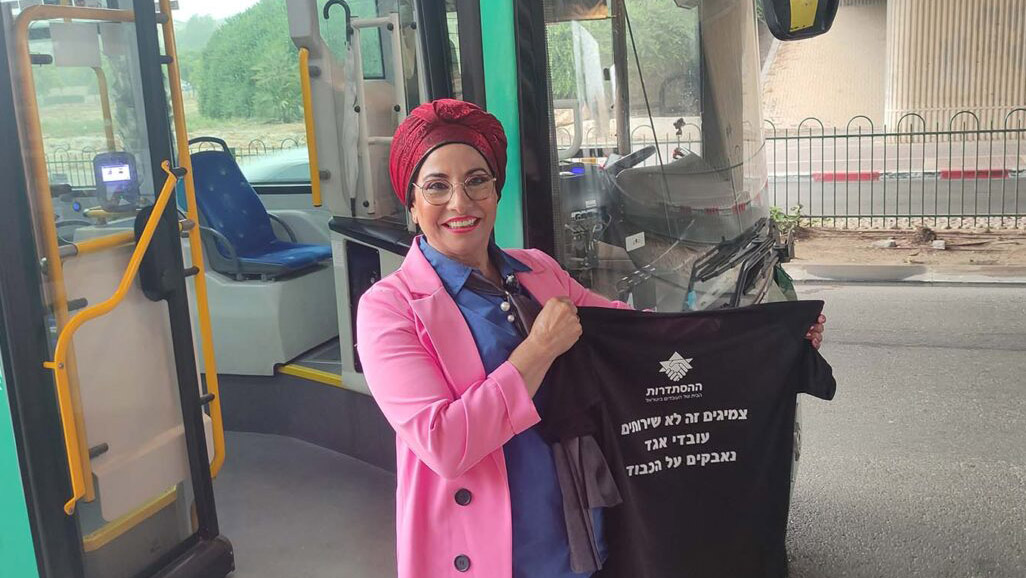
A pungent odor of urine rises from the underpass of a bridge on Highway 7 at the southern exit of Gedera, and dark spots surround them. This is the alighting station of lines 1 and 2 of Egged, the city bus lines of the neighborhood.
At 5:45 a.m. Michael Atias is already sitting in the driver’s seat of his bus, waiting to begin his route.
“We have almost no breaks while driving our routes – maybe a few minutes between finishing one route and starting another,” he explains. “Drivers have no other choice but to relieve themselves on the underpass.”
Although the bus stop is located at the edge of the underpass, there are already dozens of runners passing by because it is located near the local running track.
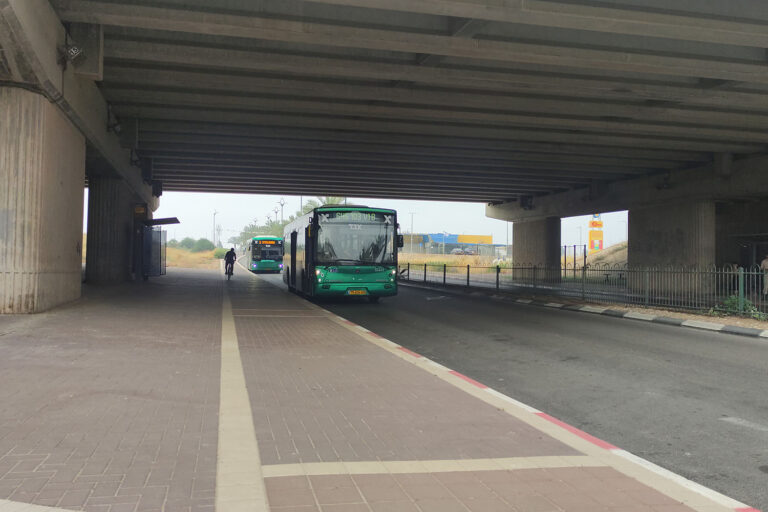
Until a year ago, the alighting stop of the city’s bus lines was located at the central bus station in Gedera, where drivers could rest and recover at various cafes in the area. However, business owners complained to the city that the bus drivers were hurting their business at the station, and consequently parking was banned. Now drivers are forced to take their breaks in the middle of nowhere.
This lack of rest stops and toilets has prompted Egged drivers to declare a labor dispute in early April. They are joining ranks of other bus drivers who protest their low wages and bad working conditions, including from the Superbus and Electra Afikim bus lines, who went on strike last week, shutting down bus services around the country and blocked roads in Haifa and Jerusalem.
“The toilets are either broken or filthy”
“Management told us we could use lavatories at a nearby gas station, but it takes too long to go back and forth, when our break is usually less than seven minutes long,” Atias explains.
“We were told to get there by bus, but try to imagine what it’s like to get a bus into a gas station – it’s not a simple maneuver, and sometimes is quite dangerous. The toilets there are also often broken, and when they are not broken they are filthy.”
Needless to say, drivers who simply seek to be at ease between one stressful route and the next also endanger themselves legally when they urinate on the side of the road. Just last month, an Egged driver in the Haifa suburb of Kiryat Ata was fined 730 shekels ($220) for ‘defecating in a public place’ when he was forced to relieve himself on the side of the road because there were no bathrooms nearby.
At 6:00, Sigalit Mergui sets off on bus line 1, which makes winding turns around the town. “Men can use the bathroom on the street, which is unpleasant and inappropriate. But what is a religious woman meant to do?”
Mergui said that on numerous occasions she encountered embarrassing situations with other drivers who were unable to hold their bladder or bowels for the duration of a shift.
“I have to hold it – I don’t drink sometimes and often finish work feeling very weak”
There are also female drivers who go to the bathroom in bushes on the side of the road, and one in one instance a driver was even photographed.
“For me, it’s just not an option [to use the bushes],” says Mergui. “So I hold it in. I don’t drink water sometimes and often finish work feeling very weak and with headaches. There was one time when I had to stop at the Central Station to use the bathroom – and I received a ticket. I tried explaining to the officer but he wasn’t interested in an explanation.”
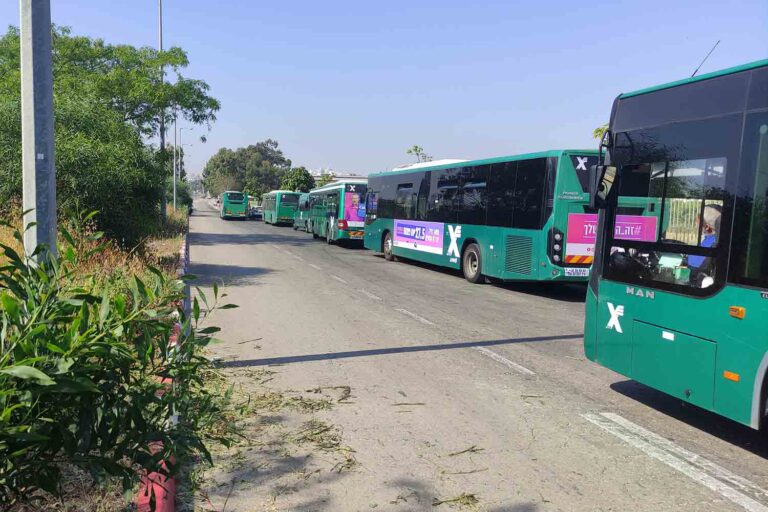
According to Mergui, this is a real barrier in the integration of women in general and religious women in particular in the driving industry, which is understaffed by some 3,000 workers and desperately seeking more hands.
“I have female friends that are interested in joining the profession and ask me about it," she says. "[The lack of restroom options] is definitely a consideration for them. There are also bus routes whose alighting stations have toilets – but are shared with men and women, with no privacy barriers or door locks, and I have been in awkward situations in the past.”
Mergui emphasizes that she loves her job and her interactions with bus riders while on the road.
“I became a driver three years ago. I always dreamed of driving a bus. My husband was worried, and he told me the road was tough and I was too gentle – but in the end he saw that I was persevering.”
“There’s a big park here, why not install toilets?”
At the new alighting station in Rehovot, there are no bushes or pillars for any driver to hide behind when defecating. The stop is located in the middle of a residential street opposite a park. Haim Levy, who drives route 14, says he has no choice: “I just look left and right to see if there is anyone approaching [and do my business].”
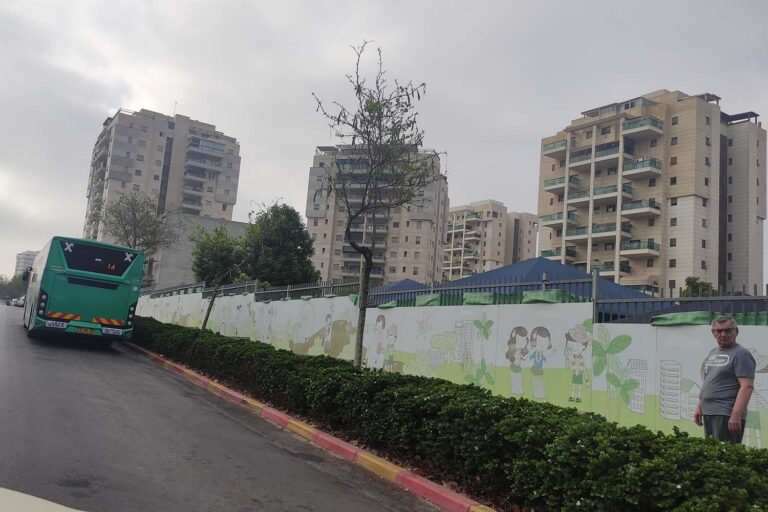
Levy says he tries to turn his back so no one can see. “There’s a big public park opposite here, why can’t the municpality install toilets there so we can act like humans?”
Sometimes, he says, when there is enough time – you can park the bus near the cemetery and use their washrooms.
Not far away, at the Weisgal Pool bus stop, three drivers who finished their routes talk amongst each other about their anger at Transportation Minister Merav Michaeli. Michaeli so far has refused to raise public transport drivers’ wages, despite the heavy shortage and harsh working conditions. One of them, a driver named Sarit, says that there are toilets in the pool next to the bus stop – but when she approaches to enter, she is not let in.
“‘The Ministry of Transportation does not allow it,’ they say. So what do we do? Hold our bladders until my break at 9:30 after I’ve already been working for more than three hours?”
According to the drivers, one of the neighbors from the neighborhood once photographed a driver urinating at the stop, and sent to the photo along with a complaint to management.
The guard at the entrance to the pool sits in an air-conditioned boutique with access to electricity – following a law initiated in 2017 by MK Yulia Malinowski, which stipulates that an employer is obliged to provide security guards with shelter from the weather, and access to water and other services. A similar law geared toward bus drivers has not yet passed in the Knesset, so perhaps the drivers waiting between routes at the stops we visited were forced to wait outside in the heat: company management instructed them to keep the air-conditioning off in bus to save energy and costs, however did not provide any alternatives.
“It’s a matter of safety”
The head of the Egged workers’ union in the southern region, Liran Mizrahi, wonders why these problematic new alighting stations that were placed on the roads on were chosen in the first place. Both are only five minutes away from the city’s main Egged parking lot, where there are toilets, a restroom and even a dining room.
“It’s not just a matter of respectful working conditions but also a matter of safety," he said. "The station at Weisgal at night is extremely dark with no lighting at all, and buses are required to drive in reverse sometimes – already there have been several accidents.”
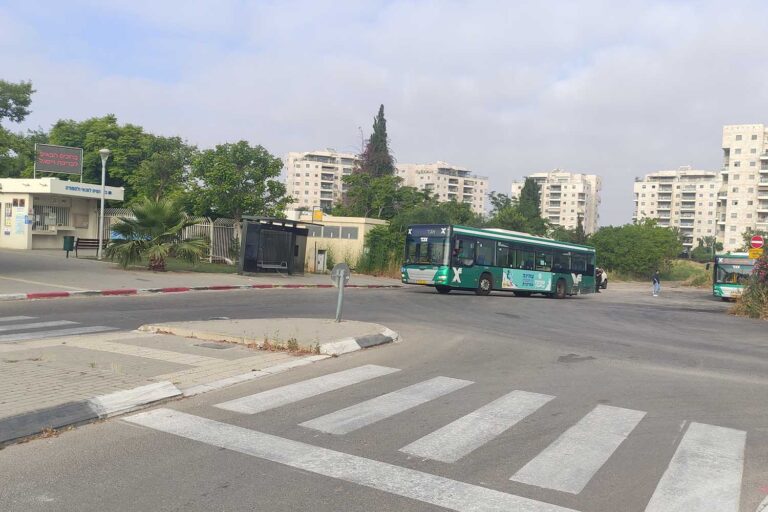
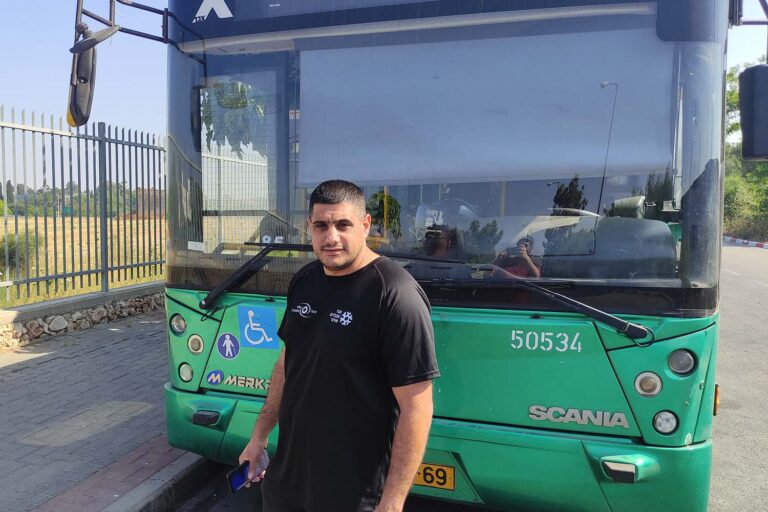
“We will not hesitate to stop the routes”
Mizrahi distributes black shirts to drivers, which read, “Tires are not toilets.” Drivers replace their uniformed blue shirts with protest shirts.
“We declared a labor dispute as early as the end of April, and in the meantime we are avoiding organizational marches that will hurt passengers – but the drivers are close to their breaking point,” says Mizrahi. “If it seems that our protest does not bear fruit, we will intensify the struggle, and if necessary, we will not hesitate to disable the lines.”
in response to the driver’s unions actions, Egged said: “We are working to expand and add refreshment stations and services, that’s the responsibility of the Ministry of Transportation”
Egged stated: “At the end stations of the vast majority of lines there is a request for refreshments and services. Regarding the minority of lines where there is difficulty, Egged is constantly working with the authorized bodies to expand and add refresh stations and services to its drivers. The Planning and Building Laws prohibit Egged from setting up refreshment stations and services on its own in public areas that it does not own. “Yes, Egged proposed to the workers’ representatives to set up temporary toiletry services as an interim solution.”
According to Egged spokesman Ron Ratner, the announcement of the labor dispute in this matter is illegal. “Any action to harm public transportation under the heading of a strike or protest measures is illegitimate and harms passengers without any purpose.” In light of all this, Egged appealed to the Labor Court to prevent the measures taken by the workers’ representatives. “Even the knowledge that the Histadrut has allowed drivers to deviate from the route of the line and travel to another place is clearly illegal and leaders can not take the bus hostage and travel to another place than the one set for the line on the route determined by the Ministry of Transportation.”
“Egged makes every effort to enable every driver to refresh and use the services, and maintains ongoing commands with the employees’ representatives in this matter, while promoting solutions in the few places where there is still a problem.”
The Ministry of Transportation and Minister of Transportation Merav Michaeli did not respond.
This article was translated from Hebrew by Matt Levy.






